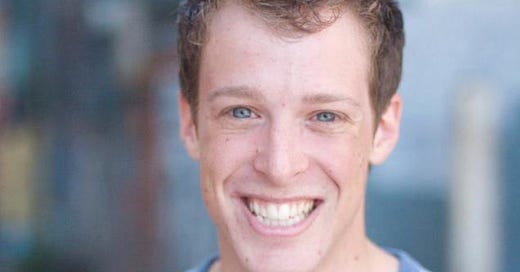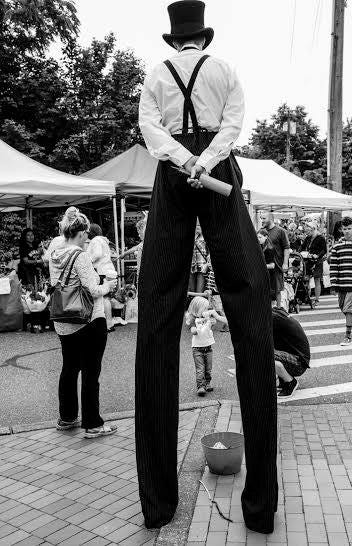More and more disabled writers are getting published but they’re still vastly underrepresented in bookstores across the world. For instance, the most recent data from 2019 shows that 89% of those working in publishing in the US identify as non-disabled. That’s why I was eager to get my hands on Mickey Rowe’s new book, Fearlessly Different: An Autistic Actor's Journey to Broadway's Biggest Stage.
Rowe made history in 2017, as the first actor with autism to play the lead character in The Curious Incident of the Dog in the Night-Time, a story about a boy with autism who tries to solve the murder of a neighbor's dog. The play is based on the novel by Mark Haddon and it was my favorite book growing up. While I wasn’t able to snag tickets to see him perform it live, he received high praise for his role. Like many other talented people with disabilities he was discouraged from pursuing his dream job. He says he was told that the play was a “big show” with “big words” and that this was why they had never cast an autistic actor to play the role of an autistic boy.
That’s why I’m thrilled to announce that Rowe is also part of our #DreamJobClub. He’s been working early mornings at a grocery store to make ends meet, but he would love to build up his career speaking about autism and employment, diversity and inclusion as well as how universal design benefits everyone. Now is a great time to book him to come and speak at your organization, especially since Autism Awareness Month is approaching!
“I’ve spent the months before my book comes out working bagging groceries at a grocery store at 5am. I’m hoping that after the book comes out I won’t have to work at grocery stores anymore! At the same time I’m thankful for grocery work because just at the start of the pandemic my state became one of the few in America where people with developmental disabilities have the right to a minimum wage like everyone else. Before the pandemic to make ends meet I had to street perform and busk frequently. I liked busking because most people feel really uncomfortable around me because I’m autistic, but when I’m street performing, everyone who sees me smiles. But this is also really hard because the weather in Seattle is rainy and not good for being outside all year. I’ve gotten to be a public keynote speaker at Lincoln Center for the performing arts and The Kennedy Center’s lead conference. My dream is that after my book is released I will be able to be a speaker and keynote as my job much much more and still walk and work at grocery stores much less.”
-Mickey Rowe
Here’s a short excerpt of his book he’s agreed to share with our community to celebrate the publishing of his book. You can buy #FearlesslyDifferent or meet Rowe during his book tour events, one of which is with friend of Airplane Mode Emily Ladau at April 11th at the Strand bookstore in New York City.
***
Curious Incident and being the first openly autistic actor to play an autistic character professionally has completely changed my life, and now here I am, in airports and hotels feeling like the proverbial fish out of water. Funnily enough, I do think to myself sometimes that I am in general a bit like a fish: I like to keep moving. Swinging, rocking. It helps me focus. My whole life I’ve been discouraged from visibly autistic behaviors like rocking back and forth, but over the course of my adult life, I’ve decided that if a meeting is dragging, a little bit of movement sure helps me lock back in. I’ve finessed it enough to find the balance of moving enough to focus and regulate myself but doing so where it doesn’t concern or worry nonautistic people. Nonautistic people seem to be easily worried by my movements.
I study the velvety seats, one by one. Who will sit in this one? Maybe a parent of an autistic child, simply wanting some reassurance that everything will be okay. They’re wanting to head home tonight feeling encouraged that their child does indeed have a shot at falling in love and having a family of their own—what they feel is leading a “normal life.” They’re hoping that seeing an autistic person delivering a keynote speech on a Broadway stage will give their weary hearts a rejuvenating jolt, so they can keep the faith that despite the fact that 85 percent of college graduates on the autism spectrum are unemployed, their child can actually make it into that elusive 15 percent of autistic college graduates with a job. I know these parents. They flood my inbox regularly, grasping and aching for me to calm their fears of the unknown.
How about this seat? Maybe here will be a person who is incredibly skeptical about the quality of content I will deliver tonight. They expect to leave feeling proud of how noble they were to encouragingly nod and clap at a developmentally delayed person piecing together simple words about his hard times in life. Maybe they will try to wait around after to clasp my hand while slowly and clearly telling me they were so inspired by my speech; did I write it all by myself? Wow!! I know these people too. They are the teach- ers, the family friends who thought I was too dim to notice them speaking in hushed tones about delays and retardation, voices brightening when I came close, being oh so Very Encouraging of the most simple things I did.
I’m sure these types of people and more will fill these seats tonight. I finally break my gaze from the repetitive rows of chairs, looking up to see the mammoth set pieces being stored above the stage, hoisted up by giant pulleys. It looks like all available space above the stage is filled, meticulously hung with lights, speakers, and all other manner of bare-bones elements that are primed and ready to burst into life at the word of a stage manager, stunning spellbound audiences with spectacular theatre magic and special effects. There is nothing sensory friendly about the brash fullness of what they are capable of unleashing. But there is nothing sensory friendly about the world I live in either. Like many autistic people, I have sensory processing disorder. This city is a continual assault on all senses. I’m grateful to have found my ways of navigating a world that is not sensory friendly. Headphones, V-neck shirts, the subtle clenching and unclenching of a fist.
“Mr. Rowe?” Interruption. I turn to see a production assistant, hugging a clipboard and clutching a Starbucks cup. “Your dressing room is ready for you now. This way.” I thank them and follow their lead. Up onto the stage, off through a wing, down a hallway, on my right. I look back the way we came, remembering this route for later. They are saying some helpful information about the room, I’m sure, but I’m busy taking it all in.
The familiar: lights around the mirrors, a rack neatly packed with elaborate costuming, wig forms evenly spaced above the rack.
The unfamiliar: the wig form is not right, an emerald bathtub ring of makeup staining the canvas head.
Then it hits me: that green crown of schmear can only mean one thing! I realize that I am in the dressing room of the misunderstood Elphaba, one of the two leading roles in Wicked. I look around, and more of her world pops out at me. The dark green gowns, green makeup, and the rest, waiting to be used again to turn the actress into the verdantly hued witch the next day.
I was a lonely autistic high schooler, bag full of behemoth large-print text- books, pacing the hallways with no friends, going home after soulless special education to cover my ears with my fists in the corner of my room. How did I get from there to being here surrounded by magic? Just weeks before, I escaped the most confusing, cold-sweat inducing, and skin-crawling situation of my life. Fleeing danger one morning before the sun came up, my heart racing, with my autistic son in hand. But now I force myself to forget that and pretend it never happened. I tuck my thumb inside my fist. I squeeze my thumb once. Then twice.
Rehearsal may be over for me, but I know that in moments the camera crew from HuffPost will arrive to wire me up with microphones for an interview. They will poke and pry into my mind; then soon after it will be almost time for me to get back onstage, this time before an ocean of filled seats. Until then, this is my moment of peace, kept company by a host of green treasures.
You may ask yourself, what is an autistic “adult”—although I still think of myself as a boy most often—doing speaking in front of thousands of people as an actor? I often ask myself that question, but less and less these days, because I learned to shift my thinking and believe a statement that has profoundly changed my life: my differences are my strengths.
In what seems like the blink of an eye, the moment of peace has passed, the procedurally probing interview has come and gone, and I am back under that piercing spotlight. Although thousands of eyes are fixed on me now, an easy relief washes over me; gratefulness that these words have tumbled from my tongue enough times to be somewhat muscle memory. I can relax just enough to relish in this moment: center stage at the hallowed Gershwin Theatre. With 1933 seats, it’s the largest house on Broadway, and tonight the expansive cavern seems bursting at the seams, packed with people hang- ing on my every word. I feel like I’m bursting at the seams too. Clench fist once, twice. Relax.
I begin my speech.







Not many journalists cover disabled people so rigorously as you thank you so much🙏 my elder brother is also autistic such articles give me great happiness and joy!😊😊😊